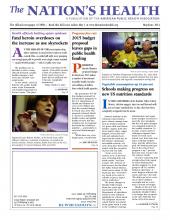Breast cancer treatment can save lives, but it may also create financial problems, particularly for minority women, according to a study published online in March in the Journal of Clinical Oncology.
Four years after being treated for breast cancer, a quarter of study participants said they were worse off financially, at least partially due to their treatments. Also, 12 percent said they still had medical debt from their cancer treatment. Financial difficulties varied by population group as well, with Spanish-speaking Hispanic women most likely to experience financial debt. Such debt was also more likely among English-speaking Hispanic women and black women than among white women. The study was based on surveys with more than 1,500 women in Detroit and Los Angeles who had been diagnosed with breast cancer.
“As oncologists, we are proud of the advances in our ability to cure an increasing proportion of patients diagnosed with breast cancer,” said study author Reshma Jagsi, MD, DPhil, an associate professor of radiation oncology at the University of Michigan Medical School. “But as treatments improve, we must ensure that we do not leave these patients in financial ruin because of our efforts.”
Financial decline associated with breast cancer was also more likely among women younger than 65 years old, those with a household income of less than $50,000 at the time of diagnosis, and women with part-time employment at the time of diagnosis. In addition, financial problems were associated with breast cancer reoccurrence, insufficient prescription drug coverage and receiving chemotherapy treatment. English-speaking Hispanic women were more likely to increase their credit card debt to pay for their medical expenses, the study found, while black women were more likely to leave medical bills unpaid. Minority women with breast cancer were also more likely to borrow money from family and friends than white women with breast cancer.
Overall, 15 percent of survey participants reported employment declines since their breast cancer diagnosis, with nearly three-quarters attributing the decline to their breast cancer. Also, 18 percent of women reported that their health insurance status worsened after diagnosis, with 73 percent attributing the effect, in part, to their breast cancer. Among women who worked after diagnosis, 7 percent reported increased work hours to cover cancer-related expenses, 27 percent reported decreased work hours due to cancer-related health problems and 7 percent said they believed they were denied job opportunities due to their diagnosis.
Overall, minority women were most vulnerable to breast cancer-related financial decline, even after researchers adjusted for income, education and employment.
“I was quite struck by the observation that patients were having to move out of their home because of their medical expenses, having their utilities turned off because they couldn’t afford them, and other such significant hardships, which I have not recognized in my own practice,” Jagsi told The Nation’s Health.
Jagsi noted that expansions in Medicaid eligibility authorized via the Affordable Care Act as well as the creation of a federal Consumer Financial Protection Bureau to oversee consumer credit could positively impact the financial experience of breast cancer patients. She also said that the study findings underscore the need for better communication between patients and providers regarding the financial implications of cancer diagnosis and treatment decisions.
“Providers, researchers and policy-makers alike must make dedicated efforts to maintain the quality of care while reducing costs in order to help prevent the lasting deleterious impact on the financial well-being of patients,” Jagsi said.
For more information, view the study abstract at http://jco.ascopubs.org/content/early/2014/03/18/JCO.2013.53.0956.abstract?sid=701b3f30-2f6c-4f27-9446-2004317da289.
- Copyright The Nation’s Health, American Public Health Association









